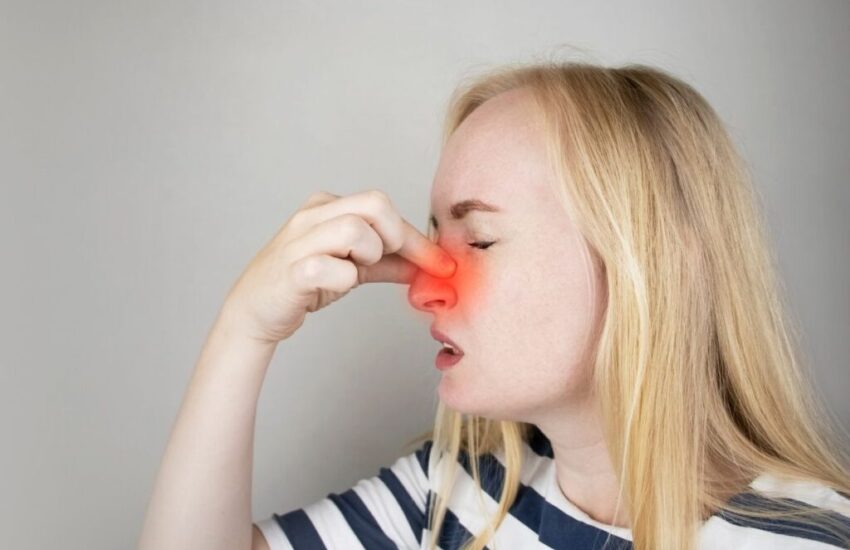7 Natural Decongestant Remedies for Clogged Nose and Ears

Published October 11, 2022
When you’re suffering from nasal and ear congestion, the first thing you probably do is go to your medicine cabinet and take some decongestants—a type of medicine that provides short-term relief for congestion (e.g., stuffy and blocked nose, plugged ears, etc.). Though they are effective, they can cause undesirable side effects. It’s no wonder why many people are turning to natural decongestant remedies.
Aside from not having to worry about any potential side effects, many of these natural decongestants can easily be found at home. So if you’re suffering from a clogged nose in the middle of the night and can’t go to the pharmacy, these remedies are your best bet.
But to know if these will work on you, you first need to determine why your nose is clogged.
Common Causes of Nasal Congestion
Nasal congestion happens when there are blockages in your nasal airways that prevent the normal flow of air into your lungs. There are lots of factors that can cause this, such as:
- Colds. This is one of the most common causes of a stuffy nose. The common cold is caused by a viral infection that swells up your nasal cavities and blocks your airways. It’s usually harmless and goes away after a few days.
- Flu. It’s a contagious illness caused by the influenza virus. Aside from a stuffy nose, it can cause fever, chills, and a general feeling of fatigue. But like colds, it goes away on its own. Though in some cases, it can be fatal.
- Sinus infection. Commonly known as sinusitis, this happens when the tissues lining your sinuses are inflamed. Among its symptoms are headache, nasal congestion, and loss of smell. Acute cases can last for a couple of weeks but chronic ones may last up to 12 weeks or longer.
- Allergies. Sneezing, itchy nose, teary eyes – these are just some of the signs that your nasal congestion is due to allergies. This usually happens when you are exposed to allergens like dust, pollen, and molds.
- Irritants. Substances like strong acids, solvents, and detergents are not only bad for your skin. It can irritate your nasal airways too, causing them to swell up.
- Nasal polyps. These are growths on the lining of your sinuses. If it gets too big, it can block your airways making it hard for you to breathe. This usually requires surgery.
- Deviated septum. This is when the bone or cartilage that divides your nose in half is crooked. As such, one nostril is smaller than the other. Like nasal polyps, this too may need surgery.

The Best Natural Decongestant Remedies
Here are some of the most preferred natural decongestant home remedies:
1. Hydration
Mucus plays an important role in your respiratory systems. It keeps the nose moist, warms your breath, and traps external irritants like pollen, dust, smog, germs, and bacteria to prevent them from going into your body.
Though it’s mostly beneficial, mucus can worsen nasal congestion if it’s thicker and harder than it should be. It’ll take longer to push, and as a result, they may build up on your sinuses, preventing air from flowing through.
Drinking lots of water helps you avoid this. If you’re well-hydrated, the mucus that your body produces will become moist, much thinner, and more watery. As a result, it’s able to move out of your sinuses more easily and quickly. But keep in mind that the water’s temperature is crucial. Hot water works perfectly, but drinking cold water may thicken the mucus instead according to this study.
2. Nasal Irrigation
Nasal irrigation is the process of flushing your nostrils with a saline solution (salt and water). The idea behind this is to get rid of all the allergens, bacteria, and any other debris that might have entered your sinuses.
This, in turn, prevents infections and allergies. In addition, salt has natural antibacterial and anti-inflammatory properties. Therefore, it can reduce the swelling on your sinuses, which might be contributing to the congestion.
Many people use neti pots to flush their sinuses, but you can also use a bulb syringe or a squeeze bottle. You fill it in with the saline solution, place it inside one of your nostrils, then pump the water out and wait for it to come out of the other nostril. There are also various “sinus rinse” kits available online to make it easier.
3. Steam Inhalation
Have you noticed that when you’re sick, having a bowl of steaming hot soup or tea makes you feel better?
That’s because hot beverages are found to provide immediate relief from congestion to some individuals.
So, while steam doesn’t necessarily cure infections or congestion, a decongestant doesn’t have to do either one. It’s often enough if it provides short-term relief. That’s precisely what steam or hot air does to the body.
With that in mind, if you have no hot soup or tea, an accessible alternative is steam therapy. Just pour steaming hot water into a small basin or a washbowl. Then, throw a towel over your head and lean over the bowl. Make sure to put your nostrils directly above the steaming water so the moist air can work its way up to your nose.
4. Hot Shower
Apart from inhaling steam directly into your nose or consuming hot beverages, applying heat to your body may have the same, albeit not as potent, effect. That’s because heat can potentially alleviate depression. Again, it doesn’t make the mucus any thinner or more watery, but it relieves the symptoms of ear or nose congestion.
5. Warm Washcloth/Compress
Warm washcloth or compress is yet another natural nasal decongestant that makes use of the fact that heat can relieve congestion symptoms. It works the same way as a hot shower in that it can improve your mood.
Moreover, applying heat to the body can soothe discomfort from the afflicted area.
You can use any type of washcloth or even a small towel. Soak it in water that’s hot enough not to burn your skin. Squeeze out the extra water then put it over your upper nose and lower forehead.
When the water gets cold, you can repeat the process again.
6. Spicy Foods
Most spicy foods like chili peppers contain capsaicin. According to studies, capsaicin is a compound that helps break up mucus and thin them down. The spicy taste also stimulates your body to produce more mucus to wash the offending taste out. All these help improve mucus drainage and de-clog your nasal airways.
7. Probiotics
Also dubbed as the “good bacteria”, probiotics are live microorganisms that are beneficial to your health. Though people tend to associate them with gut health, they can help you get rid of nasal congestion too.
As you know, one of the causes of nasal inflammation is a bacterial infection. When bacteria enter your nose, the dark moist caverns in your sinuses provide the perfect breeding ground for them.
Probiotics help your body fight these harmful bacteria by crowding them out. This prevents them from multiplying and causing further damage. You can get probiotics from foods like yogurt, sauerkraut, kimchi, and other fermented dishes. Hence, they’re the perfect natural decongestant for kids.
When to See a Doctor
At the end of the day, home remedies can only do so much. In certain cases, they can only provide temporary relief. If your nasal congestion is due to an underlying medical condition, they won’t be of much help.
So if the above home remedies don’t work or your symptoms worsen, then it’s time to visit your doctor.
Benefit From The Latest Advancements In Probiotic Science With Bionaze
Bionaze is a proprietary blend of probiotics proven to promote ear, nose, and throat health, improve digestion, and support your immune system. The active ingredients BLIS K12, and BL-04 are considered among the best probiotics according to science.
Get 25% Off Your First Order when you use BIO25 at checkout!

This Content Has Been Reviewed For Factual Accuracy
This content has undergone thorough fact-checking by our team of internal experts. Learn more about the meticulous editorial standard for our website here.
ADVERTISEMENT

About The Author
Lenard Arceo is an experienced writer who enjoys learning to code in his spare time. He has a fascination with health and nutrition and enjoys sharing his knowledge and research. He is proud of his commitment to communicating factual content that has helped his readers with life changing choices over the years.




